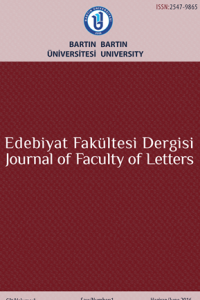KAHKAHA AT AMA GÜLÜMSEME ARTIK: USHER KONAĞININ ÇÖKÜŞÜ ÖYKÜSÜNDE İDEOLOJİ VE TARİH
Edgar Allan Poe’nun Usher Konağının Çöküşü öyküsü, yalnızca Amerikan edebiyat tarihi değil, dünya edebiyat tarihinde de, dönüm noktası olagelmiş bir gotik şaheseridir. Öykü, dostu Roderick Usher’ın daveti üzerine Usher Konağı’nı ziyaret eden anlatıcının yaşadığı dehşet verici birkaç günü ve Usher’ın kızkardeşi Lady Usher’ın ölümü üzerine konağın çöküşünü anlatır. Usher’ın Konağı öyküsü, yalnızca içerdiği korku öğeleri ve yarattığı gotik atmosferi sebebi ile değil, aynı zamanda 19. yüzyıldaki tarihsel ve toplumsal dönüşümleri yansıtması, aristokrasinin çöküşü ile Aydınlanmanın ürettiği modern şehirli aydının yaşadığı ikilemleri temsil etmesi, sanayileşme ve endüstrileşmenin yarattığı hayalkırıklarının yarattığı kimlik karmaşalarını merkezine alması açısından da önemli bir öyküdür. Bu bağlamda, bu makale, Edgar Alan Poe’nun yarattığı endişe, bilinmezlik, ve yıkım dolu öyküyü, Yeni Tarihçi bir bakış ile ele almayı ve bu yaklaşım çerçevesinde, gotik türü, ve özelde de Usher’ın Konağının Çöküşü öyküsünün, yaratımında tarihsel ve ideolojik etmenlerin belirleyici önemini tartışmayı amaçlamaktadır.
Anahtar Kelimeler:
Edgar Allan Poe, Usher Konağının Çöküşü, gotik, 19. yüzyıl edebiyatı, yeni tarihselcilik
LAUGH BUT SMILE NO MORE: IDEOLOGY AND HISTORY IN THE FALL OF THE HOUSE OF USHER
American literature as well as the history of world literature. The story focuses on a short trip of the narrator to the family mansion of Roderick Usher who mysteriously invited him to vist Usher and his sister, Lady Usher. Upon Lady Usher’s death, the house literally falls apart and the narrator hardly manages to escape to tell the story to the rest of us. The House of Usher story is not significant for horror elements and its gothic atmosphere but beyond that it has been regarded as a cornerstone in the history of literature as it reflects radical historical and social transformation in the 19th century America, it successfully portrays the dilemmas of the enlightenment intellectuals after the fall of aristocracy, and it highlights the disillusionment of modern industrilization. In this respect, this article will seek to investigate the story that presents a world of anxiety, ambiguity, and collapse with a new historicist approach which enables a historical and ideological analysis of gothic genre, and the House of Usher story in particular.
Keywords:
Edgar Allan Poe, The Fall of the House of Usher, gothic, 19th century literature, new historicism,
___
- Abel, Darrel. “Usherlar’ın Evinin Anahtarı”. Kitaplık Edebiyat Dergisi. Ed. Murat Yalçın.Istanbul: Yapı Kredi Yayınları, Nisan 2004. s. 81‐89.Armitt, Lucie. Contemporary Women’s Fiction and the Fantastic. Great Britain: MacMillanPress, 2000Barrett, Michelle. Marx’tan Foucault’ya İdeoloji. Çev. Ahmet Fethi. İstanbul: Mavi Ada, 2000Brannigan, John. “Introduction: History, Power and Politics in the Literary Artifact”. LiteraryTheories: A Reader and A Guide. Ed. Julian Wolfreys. Edinburgh: Edinburgh University Press,1999. s. 417‐427Cohen, Walter. “Marxist Criticism”. Redrawing the Boundaries. Ed. Stephen Greenblatt andGiles Gunn. New York: The Modern Language Association of America, 1992. s. 320‐348.Eagleton, Terry. Literary Theory. Minneapolis and London: University of Minnesota Press,1983Frye, Northrop. “The Mythos of Summer:Romance”. Modern Genre Theory. Ed. David Duff.Edinburgh: Longman, 2000. s. 98‐118Jameson, Frederick. “Magical Narratives: On the Dialectical Use of Genre Criticism”. ModernGenre Theory. Ed. David Duff. Edinburgh: Longman, 2000. s. 167‐193Jameson, Fredrick. Postmodernism or, The Cultural Logic of Late Capitalism. London: Verso,1993Karl, Frederick. R. “Gothic, Gothicism, Gothicists” The Adversary of Literature: The EnglishNovel in the Eighteenth Century‐A Study in Genre . New York: Farrar, 1974. s. 235‐274Lawrence, D. H.. Klasik Amerikan Edebiyatı Üzerine İncelemeler. Istanbul: Yapı KrediYayınları, 1996Leatherbarrow, David. “Mimari Poetikanın Mirası”. Kitaplık Edebiyat Dergisi. Ed. MuratYalçın. Istanbul: Yapı Kredi Yayınları, Nisan 2004. s. 71‐81.Montrose, Louis. “New Historicisms”. Redrawing the Boundaries. Ed. Stephen Greenblatt andGiles Gunn. New York: The Modern Language Association of America.,1992. s. 392‐418.Oskay, Ünsal. Çağdaş Fantazya. Ankara: Ayko Yayıncılık, 1982.Poe, Edgar Allan. Selected Tales. London: Penguin Classics, 1994. s. 76‐95Punter, David. The Literature of Terror: A History of Gothic Fictions from 1765 to the PresentDay. London & NY: Longman, 1980.Ruland, Richard and Malcolm Bradbury. From Puritanism to Postmodernism‐ A History ofAmerican Literature. New York: Viking, 1991.Taniyan, Baysar. “Denying the Narrator: Julian Barnes’s The Sense of an Ending”. EnglishStudies: New Perspectives. Ed. Mehmet Ali Çelikel and Baysar Taniyan. New Castle: CambridgeScholars Publishing, 2015. s. 52‐59.Todorov, Tzvetan. “The Origin of Genres”. Modern Genre Theory. Ed. David Duff. Edinburgh:Longman, 2000. s. 193‐210Waugh, Patricia. Feminine Fictions. London and New York: Routledge, 1988
- ISSN: 2602-3520
- Yayın Aralığı: Yılda 2 Sayı
- Başlangıç: 2016
- Yayıncı: Bartın Üniversitesi
